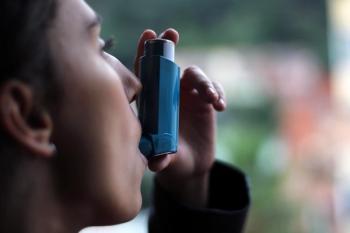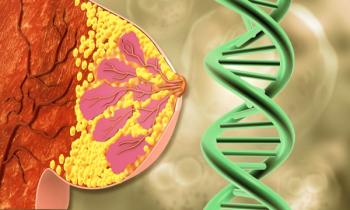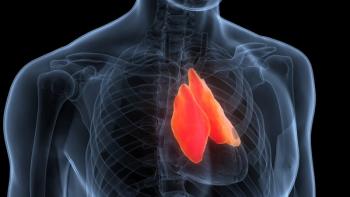
It is important to educate and bring awareness to childhood lymphoma, its symptoms, treatment options, and the need for support.

It is important to educate and bring awareness to childhood lymphoma, its symptoms, treatment options, and the need for support.

A comparison of the second-generation Bruton tyrosine kinase (BTK) inhibitor acalabrutinib to the first-generation ibrutinib shows the former had lower rates of adverse events in a real-world setting.

Hope is on the horizon for patients living with chronic obstructive pulmonary disease (COPD). CHEST 2024 in Boston featured a session highlighting emerging bronchoscopic therapies.

CMS actuaries foresee a gradual rise in per capita health spending, slowing initially but eventually outpacing economic growth.

Two posters presented at the CHEST 2024 annual meeting showed that mepolizumab significantly reduces exacerbations in patients with severe asthma and asthma with concurrent chronic obstructive pulmonary disease (COPD).

The suggestive evidence should encourage research into the associations to evaluate the association with stronger evidence.

A systematic review analyzing sleep quality and the impact of zinc supplements reveals glaring gaps in knowledge in this area despite suggested benefits, demonstrating the need for future research.

New data presented at CHEST 2024 in Boston revealed a significant link between obstructive sleep apnea and mental health disorders in middle-aged and older adults.

At the CHEST 2024 annual meeting, international respiratory society leaders highlighted the need for global collaboration to address issues like air pollution and health equity in respiratory care.

Capivasertib, in combination with venetoclax, produced promising responses in preclinical models of diffuse large B-cell lymphoma (DLBCL).

Recent results from a new diabetes reversal program demonstrate the reliable, sustained benefits of nonpharmacological interventions in the management of diabetes and overall health of patients.

Between 2011 and 2020, the Veterans Health Administration spent $78 billion on health services for veterans also enrolled in Medicare Advantage.

The Heart Failure Society of America (HFSA) annual meeting 2024 was scheduled to showcase groundbreaking research on the impact of COVID-19 on patients with myocarditis and heart failure.

Experts at CHEST 2024 highlighted significant racial disparities in lung cancer screening, treatment, and outcomes, recommending system-based interventions to improve care equity for patients of color.

A phase 3b study found that Black individuals who switched to bictegravir/emtricitabine/tenofovir alafenamide were able to maintain virologic suppression after 72 weeks.

Krunal Patel, MD, Temple University Hospital, highlights CHEST 2024 data revealing why timing matters with acute pulmonary embolism (PE) intervention.

The updated guidelines from the US Preventive Services Task Force (USPSTF) have led to an increase in screening for colorectal cancer (CRC) in individuals aged 45 to 49 years.

Blue Shield of California will offer an adalimumab biosimilar at a price that is 75% less than the reference product Humira for the monthly dose.

Experts at the CHEST 2024 annual meeting agreed that artificial intelligence (AI) should not be relied upon entirely, but instead be used as a tool by radiologists to make a diagnosis of interstitial lung disease (ILD).

Less than a third of FDA-mandated trials for drugs approved between 2015 and 2021 had been completed by May 2024.

Hereditary breast cancers are caused by germline mutations, which are genetic mutations inherited at conception and so called because they originate in germ cells, those that develop into reproductive cells and become eggs in female individuals and sperm in male individuals.

One of the first sessions to kick off CHEST 2024 in Boston looked at the future of physician compensation, which highlighted the consolidation of physician practices, unionization, the role of coding and fee-for-service payment, and the impacts of facility reimbursement, inflation, and market conditions.

Although air pollution is linked to increased exacerbations in patients with idiopathic pulmonary fibrosis (IPF), its role in disease progression remains uncertain, with evidence suggesting that both genetic susceptibility and environmental factors contribute to IPF development.

In this interview, Juan Carlos Martinez, MD, explains that while patients recognize the severity of lung cancer, there is a lack of knowledge about lung cancer screening methods, likely due to barriers such as language, education, and health care access.

Caroline Quill, MD, of the University of Rochester Medical Center, highlighted the potential of artificial intelligence (AI) and digital technologies to enhance treatment for chronic obstructive pulmonary disease (COPD) at the CHEST 2024 annual meeting in Boston, Massachusetts.

Researchers identify certain predictive factors that impact the prognosis of patients with myasthenia gravis and COVID-19 infection.

Thoracoscopic thymectomy yielded quicker recovery time in myasthenia gravis (MG) while reducing disease severity, the need for treatment, and complications.

The Center on Health Equity & Access is dedicated to reducing health care disparities by exploring innovative solutions, policies, and research that advance health equity for diverse populations.

Previous research has linked hidradenitis suppurativa to infertility, but concrete data are lacking on causality of the chronic inflammatory skin condition in this setting.

Insulin resistance plays a role in many diseases. The new research provides insights into why insulin resistance appears to be associated with neurodegenerative disorders.

259 Prospect Plains Rd, Bldg H
Cranbury, NJ 08512
© 2025 MJH Life Sciences®
All rights reserved.
